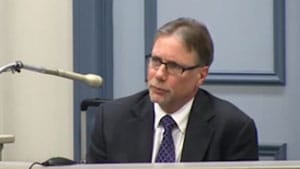

The Expert: John Sass, a neuropsychologist based in Georgia, testifies to the severity of the plaintiff’s injuries, including PTSD she suffered from the crash.

During a damages-only trial stemming from a trucking crash, John Sass, a clinical neuropsychologist from Decatur, Georgia, provides critical testimony concerning the severity of the plaintiff’s injuries.
The doctor begins by explaining that the victim in this case appeared to be suffering from a mild traumatic brain injury [TBI] and post-traumatic stress disorder [PTSD] related to the collision. As a result of these problems, he believes she has developed adjustment disorder. This occurs when a person tries to adjust to changes in lifestyle as a result of a major external life event.
The traumatic brain injury has disrupted plaintiff’s ability to focus, and in this regard the effects of PTSD overlap with the TBI. The expert explains that “she goes offline” and can’t keep things in her short term memory, but after repeated exposure she will eventually learn and retain information. He feels that this is a problem with execution and that it is consistent with her left frontal lobe brain injury as seen on the MRI. The injury to this area of the brain will affect behaviors such as planning or self-monitoring.
PTSD itself can cause a physical change in the brain once it has become a chronic condition. Over time, it actually changes the anatomy of the brain, shrinking the hippocampus where new information is processed. It changes the medial frontal lobe where her injury occurred, and enlarges the amygdala, where fears originate, due to over-activity. People with PTSD keep feeling that things are dangerous, the amygdala is overused, and it eventually becomes larger.
Sass explains that the PTSD and the mild TBI shearing seen in the left frontal lobe can affect each other. Mild TBI thus interferes with plaintiff’s ability to cope with the PTSD. The “executive” function performed by the damaged frontal lobe is needed to overcome the memory and emotional problems caused by the PTSD. At the same time, the brain injury is interfering with that “executive” function. They are, therefore, synergistic in their overall consequence.
The severe PTSD and mild TBI along with the chronic pain from the event, place plaintiff at increased risk for problems in her nursing profession. He explains that, even though she graduated from college and nursing school after the crash, these are controlled environments and not truly representative of the turmoil of the day-to-day workplace. She will have increased risk of difficulty in dealing with the real world, especially when things get chaotic. For instance children frequently die in the pediatric intensive care unit, where she works. This cannot be controlled and it could trigger her PTSD symptoms.
The expert goes on to explain that PTSD is diagnosed when a person is involved in or witnesses a traumatic event or learns about someone close who suffered a traumatic event such as her friends, who were killed in this accident. Triggers from daily life can cause flashbacks and intrusive thoughts, so the victim develops behaviors to avoid these triggers. In this case, the expert notes that she stopped attending her sorority, stopped driving on the interstate highway, and avoids trucks. Additionally Sass explains, irrational behaviors develop, such as survivor’s guilt. As the PTSD becomes chronic, mood states develop with arousal difficulties such as interference with sleep onset and sleep maintenance. This becomes a cycle.
Suicide is a risk factor in PTSD and, although the expert says plaintiff is not suicidal right now, its development could not be ruled out in the future.
The doctor’s explanation was effective, with the jury handing down a $15 million verdict.
Gary Gansar, MD, is residency-trained in general surgery. He served as Chief of Surgery and Staff at Elmwood Medical Center and on the Medical Executive Committee at Touro Infirmary and Mercy Hospital in New Orleans, LA. Dr. Gansar was Board Certified in general surgery while in active practice. He joined AMFS in 2015 as a Physician Medical Director.
The medical expert witness partner for attorneys serious about building a winning case
AMFS is your trusted source for highly-qualified medical expert witnesses. After pioneering the field nearly three decades ago, we’re continuing to redefine medical expert witness services by providing value far beyond a referral alone.
Our Physician Medical Directors know what it takes to build a strong case. Our medical expert witnesses leave no doubt. And our case managers streamline billing and logistics every step of the way, letting you focus on what you do best: constructing your winning case. Explore why AMFS clients expect more from their medical expert witnesses—and get it.

DigitalOwl Acquisition by Datavant Expands Ontellus' Capabilities, learn more here.